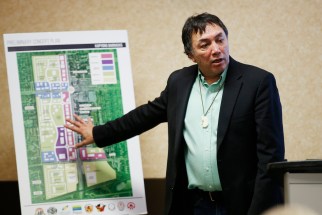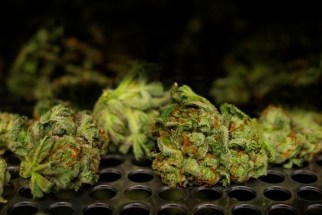Fluent in athlete Former all-Canadian rookie university basketball player Adrienne Leslie-Toogood knows of what she speaks as a Winnipeg sport psychologist with a national profile
Read this article for free:
or
Already have an account? Log in here »
To continue reading, please subscribe:
Monthly Digital Subscription
$0 for the first 4 weeks*
- Enjoy unlimited reading on winnipegfreepress.com
- Read the E-Edition, our digital replica newspaper
- Access News Break, our award-winning app
- Play interactive puzzles
*No charge for 4 weeks then price increases to the regular rate of $19.00 plus GST every four weeks. Offer available to new and qualified returning subscribers only. Cancel any time.
Monthly Digital Subscription
$4.75/week*
- Enjoy unlimited reading on winnipegfreepress.com
- Read the E-Edition, our digital replica newspaper
- Access News Break, our award-winning app
- Play interactive puzzles
*Billed as $19 plus GST every four weeks. Cancel any time.
To continue reading, please subscribe:
Add Free Press access to your Brandon Sun subscription for only an additional
$1 for the first 4 weeks*
*Your next subscription payment will increase by $1.00 and you will be charged $16.99 plus GST for four weeks. After four weeks, your payment will increase to $23.99 plus GST every four weeks.
Read unlimited articles for free today:
or
Already have an account? Log in here »
Hey there, time traveller!
This article was published 16/06/2020 (2005 days ago), so information in it may no longer be current.
Adrienne Leslie-Toogood knows athletes. They’re her livelihood.
IN CONVERSATION
With Adrienne Leslie-Toogood
They are familiar faces at events in Winnipeg and around the province, but how well do you really know the people who are the backbone of the local sporting scene? Who are these organizers, coaches, administrators and volunteers who help make the athletic culture tick? In this series, members of the Free Press sports department sit down with some of these dedicated folks for an insight into what inspires them in their work.
As director of sport psychology for the Canadian Sport Centre Manitoba, the longtime Winnipegger, who also serves on the University of Manitoba faculty and as chair of the Canadian Sport Psychology Association, has been helping to guide a wide range of elite performers.
Her client list includes the CFL’s Winnipeg Blue Bombers and WHL’s Winnipeg Ice and there is a long list of other top-flight amateur athletes who regularly tap into her expertise.
Before embarking on her professional life, the Westwood Collegiate grad was one of the top university basketball players in the country, earning all-Canadian rookie honours as a shooting guard with the Manitoba Bisons in 1989-90.
Her ability to relate to athletes is no surprise to her former coach, Manitoba Sports Hall of Famer Coleen Dufresne.
“Adrienne was always a really good basketball player, let’s start with that first,” says Dufresne. “But more importantly, she was a very good person. Very clever, intuitive, cerebral, if you will.
“I think we’re extremely lucky in the world of sport to have her in it. I think she really wants to make a difference, to make the lives of the athletes she works with better. To make their experiences in life and sport better.”
A knee injury prior to her fifth year of university prompted Leslie-Toogood to move past her competitive career and into grad school, leading eventually to a PhD from Kansas State University, where she was immersed and worked in the atmosphere of big-time U.S. college athletics.
Leslie-Toogood, a mom of two, returned to Winnipeg in 2007.
Mike Sawatzky: I imagine sports was a big part of your childhood.
Adrienne Leslie-Toogood: I loved sports. Sports played a huge role in my life and definitely I feel like my coaches helped raise me. But I also think that I really loved my teams, liked my teammates and being part of a team was always a really important part of my life.
WFP: And you were successful at the U of M?
Adrienne: We had a great time. We had lots of fun and learned how to win over the course of our time and after my fourth year, I was playing street ball 3-on-3 and I accidentally… tore my ACL. So that was the end of my basketball career.
WFP: Would you have returned for your fifth year?
Adrienne: I would have gone back, but then I had the surgery… so that’s when I ended up going to graduate school…. And there weren’t a lot of opportunities to study psychology and do sports, so I ended up kind of starting that program and then as I got into that I never did return into my fifth year of eligibility. But before that I had never been injured my lifetime…. I was really into the fitness and the training part of it and so… I ran full marathons and half marathons, I did Olympic distance triathlon, so I was really into that and I did every school sport there was. It was definitely a huge part of my life.
WFP: How did your childhood inform your professional work?
Adrienne: My dad was diagnosed with bipolar disorder when I was in Grade 11, and so prior to that there was a lot of emotional volatility and financial instability in my house. And I think the only consistent thing in my life was sport. It was a thing where I could go and I controlled all the outcomes. If I worked hard and got this result and it was very much in my control and it wasn’t dependent on anything else. And so, when I look at why I’m so passionate about sport… it played a huge role in my life, and I also saw what it looks like at home in environments where there is kind of turbulence and things that that aren’t settled. And my dad since has been on medication…. Not talking about it I think prevented him from getting the treatment that he needed…. And then when I went to university, that’s where my team was incredibly supportive, moreso than I even realized. When I was in Grade 12 is when my mom left our family. It was a difficult time and I know I just kept showing up at the gym…. When I transitioned to university, I had the opportunity to go play other places but I just didn’t want to leave home at the time and Coleen Dufresne was an unbelievable support in my life and really helped make it OK.
WFP: And basketball led to the next stage?
Adrienne: It was a big part of my life and so it was a pretty easy transition to end up working in sport. I went down to Kansas State University for a number of years. I did my pre-doctoral internship there. And then I returned there to work. I actually started a new academic degree program for them — it was called student services in intercollegiate athletics.
WFP: What was your approach as an athlete?
Adrienne: Well, on my way to a game I had cue cards and I had drawn pictures on them and so really I was doing imagery and using keywords. I would always get my brain ready. I felt my brain had to be ready to play. And it’s an open sport so it’s contextual, so I literally see myself in every possible position on the court and I’d see all the possibilities…. To feel ready to play I had to go through this process, and so I would literally see myself for different positions. If this person cut here I go there… and I literally do a lot of like, sort of seeing it in my head, and it was just kind of my natural thing that I would do. I moved on quickly from mistakes. I was very dialled in, I knew what distractions were. I loved it when other teams were trying to trash-talk me. I was, ‘Right on, I know I’ve got them.’
WFP: Who taught you that?
Adrienne: No one really taught me that. I’ve just always been that way and that’s been something I’ve had to unpack as I work in this area is recognizing it as kind of skills and helping other people learn because I think I just naturally did it.
WFP: Is it tougher for a woman practising in your field?
Adrienne: I think I was raised to not see my gender as a barrier. I was raised to do what I wanted to do and so I’ve never seen it in that way. My bet is, it might be more difficult to get invited to certain opportunities, but I know that I’ve interviewed a lot of positions and I was considering returning to the NCAA at one point and I remember I was in one interview, and I’ve had lots of opportunities at the time. I remember being asked that question: they said you’re not a male — how are you going to talk to these guys? I said, ‘I think it’ll be easier to talk to them because I am a female, and a lot of these guys have great relationships with their moms and they feel more comfortable talking with a woman about stuff that’s tough.’ I think that everyone has to operate from their place of strength and do it in their way. And again, I’m very much a relationship person and so I’m always just looking for opportunities to build relationships and connection.
WFP: How is COVID-19 changing your work?
Adrienne: In some ways not at all and in some ways a whole lot. I would say that the type of work I do changes week by week and who I’m working with. You have an athlete who is peaking and performing the best they have in their lifetime, and they’re about to go to an event and it doesn’t happen — that can be difficult…. Obviously, it’s virtual now. I’m speaking to people on a computer as opposed to in person, so a big thing for me is I’m not in a training environment anymore. I love showing up on a pool deck or in a weight room or on a wrestling mat. I love watching athletes do what they love and I learned so much from being immersed in those contexts. So that’s changed.
WFP: Do you get a lot of other requests for help?
Adrienne: I’m really happy with the opportunities that I currently have. It’s a really good fit for my life and I know that if I want to search out other things I’ll be able to figure that out but for now I love living and working in Manitoba. I love serving the athletes and the coaches that I get to work with. I love collaborating with my colleagues here. It’s a smaller centre so we do have a lot of flexibility.
WFP: I’ve heard you use the phrase “best version of yourself.” That’s a theme in your work?
Adrienne: Absolutely. I want you to be the best version of yourself and let’s figure out what that means. And work on that all the time and I think that’s when real greatness happens is when you embrace who you are and how you’re wired and you learn what gets in the way of that. And if you do that, that’s all we can ask and I hope you’re really happy. I work on that a lot and I work on dealing with failure and adversity a lot, and very much with the idea of learning and growing from experiences and that becomes the foundation we stand on. I want every athlete I work with to hold their head high regardless if it’s an amazing or a tough moment, and I know that all that’s going to be part of your story. And at the end of the day, let’s keep writing the story. Let’s not get too caught up in the fact that that race didn’t go the way you want it.
mike.sawatzky@freepress.mb.ca
Twitter: @sawa14

Mike Sawatzky
Reporter
Mike has been working on the Free Press sports desk since 2003.
Our newsroom depends on a growing audience of readers to power our journalism. If you are not a paid reader, please consider becoming a subscriber.
Our newsroom depends on its audience of readers to power our journalism. Thank you for your support.




